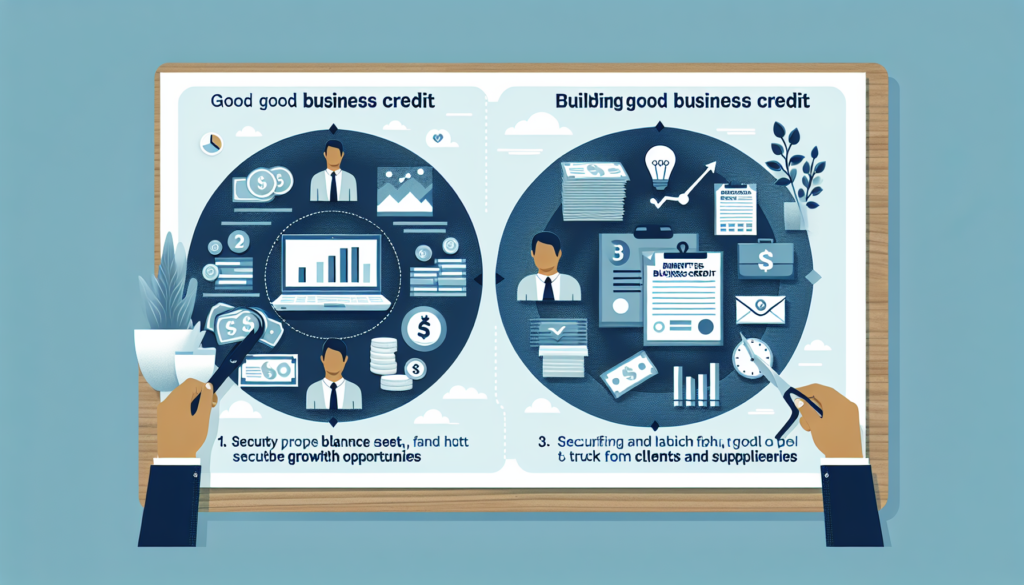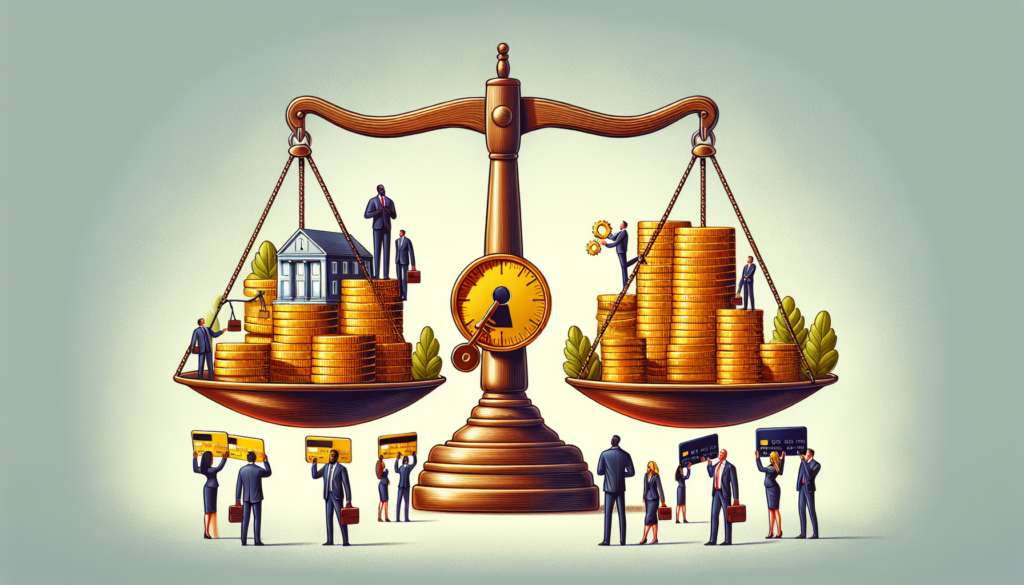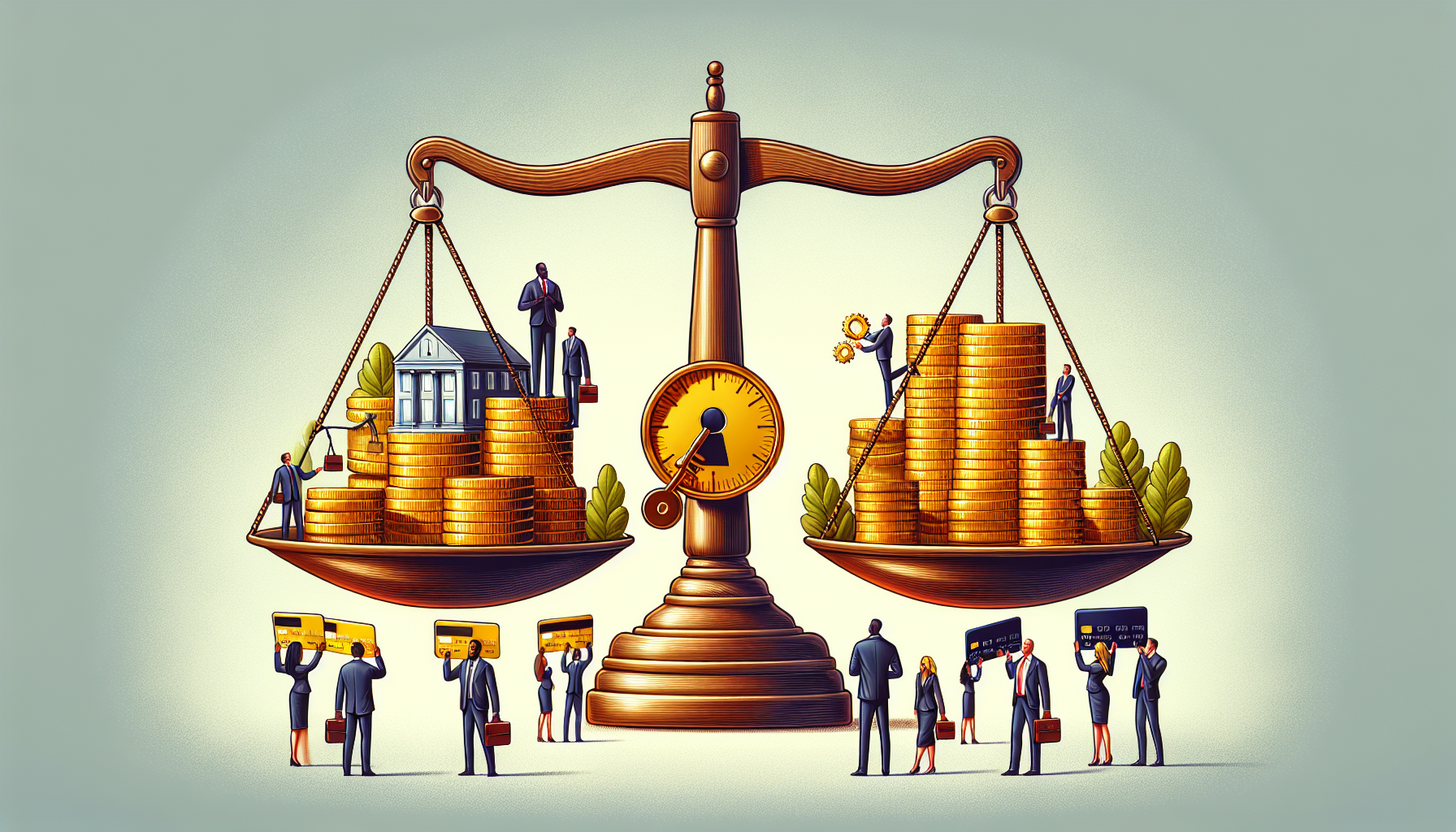Have you ever wondered why having good business credit is crucial for the success of your company? Well, the answer lies in the countless opportunities it unlocks. Building a strong credit profile not only allows you to secure financing and loans with favorable terms, but it also opens doors to potential partnerships, supplier relationships, and even better insurance rates. In this article, we will explore the various reasons why having solid business credit is a game-changer for your company, helping you navigate the competitive landscape with ease and confidence. So, let’s dive right in!

What is Business Credit?
Definition of Business Credit
Business credit refers to the credit history and rating of a business entity. It is an evaluation of a company’s ability to manage and repay its debts. It is similar to personal credit but specifically focuses on a business’s financial track record and repayment habits.
How Business Credit is Different From Personal Credit
Business credit is distinct from personal credit in several ways. While personal credit primarily looks at an individual’s financial history and personal liabilities, business credit focuses on a company’s financial track record, revenue, and ability to manage debt. Additionally, business credit is associated with the business entity, not the business owner personally, providing a separation between personal and business finances.
Benefits of Business Credit
Access to Financing Options
Having good business credit opens up various financing options for your company. Lenders and financial institutions are more likely to provide loans, lines of credit, and other financial support to businesses with a positive credit history. This access to financing can help your company expand, invest in new projects, and overcome financial challenges.
Building Credibility and Trust
Business credit plays a crucial role in establishing credibility and trust with suppliers, partners, and potential customers. A strong credit history demonstrates financial stability and responsibility, giving others confidence in your ability to meet financial obligations. It can enhance your reputation, attract better business opportunities, and establish long-term relationships within your industry.
Separating Personal and Business Finances
One of the significant advantages of business credit is the ability to separate personal and business finances. By establishing business credit, you create a clear distinction between your personal assets and liabilities and those of your business. This separation not only simplifies accounting and tax reporting but also shields your personal assets from business risks and liabilities.
Managing Cash Flow
Business credit assists in managing cash flow effectively. With a positive credit history, you can access various financial tools such as business credit cards, lines of credit, and trade credit. These resources allow you to effectively manage short-term cash flow gaps, cover operational expenses, and take advantage of business opportunities that may arise.
Expanding Business Opportunities
Having good business credit opens up doors to new business opportunities. It allows you to negotiate better terms with suppliers, obtain favorable insurance premiums, secure higher credit limits, and establish partnerships with other businesses. All these opportunities can contribute to the growth and success of your company in the long run.
Factors That Affect Business Credit
Payment History
Payment history is one of the most critical factors in determining business credit. Timely payments on loans, credit lines, and bills contribute to a positive credit history, while late or missed payments can have a significant negative impact. Consistently paying bills on time and managing debt responsibly are crucial for maintaining a good credit rating.
Credit Utilization
Credit utilization refers to the percentage of available credit a business is currently using. Higher credit utilization can negatively impact business credit ratings. It is advisable to keep credit utilization below 30% to demonstrate responsible financial management and maintain a positive credit profile.
Length of Credit History
The length of your business’s credit history is another significant factor influencing your credit rating. A longer credit history demonstrates stability and consistency in managing financial obligations. It is essential to establish credit early on and maintain accounts in good standing to build a strong credit foundation for your business.
Public Records
Public records, such as bankruptcies, liens, or judgments, can severely impact a business’s credit rating. It is crucial to avoid such negative public records as they can have a lasting impact on your creditworthiness. Maintaining a clean public record is imperative for maintaining a positive business credit profile.
Credit Inquiries
Frequent credit inquiries can have a short-term negative impact on business credit. When businesses apply for credit or financing, potential lenders may run credit checks which are recorded as inquiries. It is essential to limit unnecessary credit inquiries and only apply for credit when necessary to avoid any negative effects on your credit rating.

How to Establish Business Credit
Incorporating Your Business
Incorporating your business as a legal entity, such as a limited liability company (LLC) or corporation, is crucial for separating personal and business finances. This step establishes your business as a separate legal entity eligible to build its credit history.
Obtaining an Employer Identification Number (EIN)
An Employer Identification Number (EIN) is a unique nine-digit identifier issued by the Internal Revenue Service (IRS). Obtaining an EIN is necessary to establish business credit and is used for tax identification purposes. You can easily apply for an EIN online through the IRS website.
Opening Business Bank Accounts
Opening dedicated business bank accounts is essential for establishing business credit. Separate checking and savings accounts in the business’s name demonstrate financial accountability and differentiate business transactions from personal ones. These accounts become the foundation for conducting business and managing finances.
Applying for a Business Credit Card
Applying for a business credit card is an effective way to establish business credit. Look for credit card options that report to business credit bureaus and use the card consistently for business expenses. Timely payments and responsible credit utilization will contribute to building a positive credit history.
Establishing Trade References
Building trade references is another avenue to establish business credit. These references can be in the form of vendor or supplier accounts that report payment history to credit bureaus. Consistently making payments on time can help strengthen your business credit profile, establishing a positive trade reference history.
How to Improve Business Credit
Paying Bills on Time
Consistently paying bills on time is one of the most effective ways to improve business credit. Late payments can have a significant negative impact on your credit rating and may result in penalties and fees. Make it a priority to pay all business obligations promptly to maintain a positive credit history.
Reducing Debt and Utilization
Reducing debt and credit utilization can significantly improve your business credit. Aim to pay down outstanding balances and keep credit utilization below 30%. Lowering your overall debt load demonstrates responsible financial management and can lead to improved credit ratings over time.
Monitoring Credit Reports
Regularly monitoring your business credit reports allows you to stay informed about your credit standing and detect any potential errors or inaccuracies. Reviewing these reports also provides insight into areas that may need improvement. Correcting any inaccuracies promptly can help maintain a positive credit profile.
Rebuilding Credit After Financial Difficulties
If your business has faced financial challenges or negative credit events, it is essential to take proactive steps to rebuild your credit. This may include working with creditors to establish payment plans, paying off outstanding debts, and consistently managing credit obligations. Over time, responsible financial management can help improve your business credit.
Business Credit vs. Personal Credit
Separation of Personal and Business Finances
Perhaps one of the most significant differences between business credit and personal credit is the separation of finances. Business credit focuses solely on the finances and creditworthiness of the business entity, helping to establish a clear line between personal and business liabilities.
Different Rating and Scoring Systems
Business credit and personal credit utilize different rating and scoring systems. Personal credit scores typically range from 300 to 850, while business credit scores can vary depending on the reporting agency. Understanding the different scoring systems can help businesses navigate credit evaluations and understand their standing in each context.
Impact on Personal Credit
While personal and business credit are separate, there can be instances where personal credit may indirectly affect business credit. For example, when applying for a small business loan, lenders may consider the personal credit of the business owner as a factor in the approval process. However, maintaining strong business credit can help alleviate this dependence on personal credit.
Implications for Sole Proprietors
For sole proprietors, personal and business credit can be more closely intertwined. As the business owner, your personal credit may be a significant factor in determining your business creditworthiness. It is essential for sole proprietors to manage personal finances responsibly and establish strong personal credit to support their business credit standing.
Common Misconceptions About Business Credit
Business Credit is Only for Large Corporations
Contrary to popular belief, business credit is not exclusive to large corporations. Businesses of all sizes can benefit from establishing and maintaining business credit. Regardless of whether you are a small startup or a well-established company, building business credit is vital for financial stability and growth.
Personal Credit Does Not Impact Business Credit
While personal and business credit are separate entities, personal credit can indirectly impact business credit in certain situations. For example, lenders may consider the personal credit of business owners when evaluating a small business loan application. However, maintaining separate credit profiles and building strong business credit can mitigate the impact of personal credit.
Using Personal Credit Cards for Business Expenses Does Not Affect Business Credit
Using personal credit cards for business expenses can have both direct and indirect impacts on business credit. If your personal credit card accounts report to business credit bureaus, then your business credit can benefit from responsible credit card usage. However, using personal credit cards solely for business expenses does not automatically establish business credit. It is important to obtain business credit cards and other financial tools specifically designed for businesses to build a separate credit history.
Consequences of Neglecting Business Credit
Difficulty Securing Loans and Financing
Neglecting business credit can make it challenging to secure loans and financing for your company. Lenders and financial institutions heavily rely on credit ratings to assess the creditworthiness of businesses. Poor or nonexistent business credit can lead to higher loan rejection rates, limiting your access to necessary capital.
Higher Interest Rates and Limited Options
Without a strong business credit profile, you may be forced to seek financing options with higher interest rates or unfavorable terms. Lenders often offer more competitive rates and terms to businesses with good credit history. Neglecting business credit can result in limited options and higher costs for your company in the long run.
Restricted Business Growth and Opportunities
Business credit plays a crucial role in unlocking growth opportunities for your company. With poor or nonexistent credit, you may struggle to secure favorable contracts, partnerships, or investments. Neglecting business credit can hinder your ability to expand, invest in new projects, or take advantage of emerging market opportunities.
Negative Impacts on Suppliers and Partners
Neglecting your business credit can have negative consequences for your suppliers and partners as well. Poor credit history may lead to delayed payments or inability to meet financial obligations, damaging relationships with key stakeholders. Maintaining good business credit is vital for fostering strong partnerships and maintaining credibility within your industry.
How to Monitor and Protect Business Credit
Regularly Checking Credit Reports
Regularly monitoring your business credit reports is essential for staying informed about your credit standing. Routinely reviewing these reports allows you to identify potential errors or inaccuracies that could impact your credit rating. Keeping a close eye on your business credit reports helps you proactively address any issues and maintain a positive credit profile.
Reporting and Disputing Inaccuracies
If you discover any inaccuracies or discrepancies on your business credit reports, it is important to take immediate action. Contact the credit reporting agency to report the inaccuracies and provide supporting documentation to dispute the errors. Timely resolution of these issues protects your business credit reputation.
Keeping Personal and Business Credit Separate
Maintaining a clear separation between personal and business credit is crucial for protecting both. Avoid using personal credit for business expenses whenever possible and establish dedicated business credit accounts. By keeping personal and business credit separate, you reduce the risk of negative impacts on either credit profile.
Using Credit Monitoring Services
Consider utilizing credit monitoring services to stay on top of changes to your business credit profile. These services provide regular updates and alerts regarding any significant changes or inquiries on your business credit reports. Credit monitoring services help you stay proactive in safeguarding your business credit.
Conclusion
Establishing and maintaining good business credit is essential for the financial health and success of your company. It provides access to financing options, builds credibility and trust with partners and suppliers, separates personal and business finances, and opens up numerous business opportunities. By understanding the factors that affect business credit and implementing strategies to improve and protect it, you can position your company for long-term growth and financial stability. Remember to regularly monitor your business credit, make timely payments, and foster responsible financial management to reap the benefits of a strong business credit profile.

